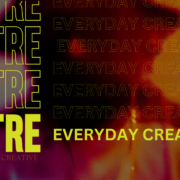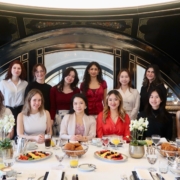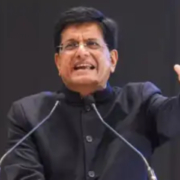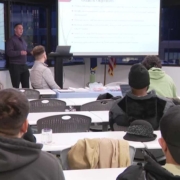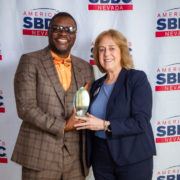How Entrepreneurs Are Turning Longevity Into A Multi-Billion Opportunity
Life, eternal.
By now, we’ve all heard of Bryan Johnson, the tech entrepreneur who spends $2 million annually in his quest for immortality.
For many of us, such an investment is well out of reach, but it taps into a primal instinct we all share: the desire to cheat death.
While most New Year’s resolutions are about cutting carbs, or finally using that gym membership, Johnson’s endeavor to live forever poses a question all of us can relate to: is it possible to significantly expand our lifespan?
The pursuit of longevity is no longer confined to philosophical musings or far-off science fiction.
It’s unfolding now, at the intersection of groundbreaking research, entrepreneurial ambition, and consumer demand.
From personalized supplements to innovative recovery technologies, the market for extending both lifespan and healthspan is booming, but in this crowded space, the lines between science, marketing, and meaningful impact are often blurred.
For entrepreneurs, the challenge lies in separating evidence-based advancements from empty promises while redefining what it means to live not just longer, but healthier and more purposefully.
Why Die When You Can Live Forever: From Elixirs to Sirtuins
The idea of defying aging isn’t new.
From the elixir of life sought by medieval alchemists to the health obsessions of Silicon Valley elites, the quest for longevity has been woven deep within the essence of being human itself.
But in recent years, it feels as though science and ambition are catching up to myth.
David Sinclair’s Lifespan captured global attention by reframing aging as a disease; a condition to be treated, not endured. Sinclair boldly asserts that our current lifespans are grossly underoptimized and that sirtuin activators, combined with other interventions, can reverse aging at the cellular level.
It’s a theory that has made him a hero to some and a pariah to others.
Critics like Charles Brenner argue that calling aging a disease is tantamount to “pathologizing life itself.” Moreover, Brenner points out that Sinclair’s favored interventions, like metformin, a diabetes drug repurposed for longevity, might do more harm than good for healthy individuals without diabetes.
This debate, as contentious as it is, mirrors a broader dynamic in science that many in the mainstream fail to fully appreciate: scientific progress thrives on disagreement.
Consensus takes a long time to develop on anything of importance that future generations will take for granted. For proof, think no further than the vehement opposition Darwin’s views on evolution faced during his time, if not still today.
But while scientists hash it out, the private sector has no patience for academic timelines.
Instead, a growing number of entrepreneurs are tapping into the market’s growing demand for a way to cheat death for a moment longer, some more scrupulous than others.
The Gold Rush of Longevity: Supplements, Skepticism and a Commitment to Science
A multi-billion-dollar industry has sprung up around longevity, fueled by consumer demand for quick fixes and life hacks.
Approximately 1,500 vitamin and supplement manufacturers operate in the US today, and the regulation around them is notoriously of the ‘self’ variety thanks to the FDA’s limited role in this area.
This means for every credible company advancing the underlying science, there are ten others potentially hawking snake oil as a consumer who inadvertently bought diet pills laced with meth from eBay came to learn.
The risks for consumers are particularly high in areas where the science itself is far from settled, as is the case for supplements targeting longevity.
For Chris Mirabile, founder of NOVOS, the wild west of wellness is an opportunity to rise above the rest by lifting his own standards.
“Most supplement companies are marketing machines first and foremost,” he says.
“They don’t invest in research about the efficacy of what they are selling, effective dosages or much else. It’s all about selling trendy products, not making a real impact,” Chris recounts his views on many of the industry peers.
In a sea of generic supplement suppliers with just a packaging and marketing department, NOVOS’ commitment to research is a clear outlier.
The company has invested heavily in scientific validation of its products, recently funding a study of aged mice that demonstrated a greater increase in lifespan than any supplement ever studied, even outperforming many medical R&D treatments. This comes after a human case study found that 73% of participants slowed their biological pace of aging by the equivalent of one month per year after six months, while nobody in the study had accelerated aging. NOVOS is also actively engaged with the scientific community, including through its membership in the Longevity Biotechnology Association.
For Chris, their investment in research is much more than marketing.
“We’re not just selling products, which is something that we could do without any research whatsoever. We’re educating people about the science of aging and making them active participants in their own longevity journey. This means that we have to go levels deeper ourselves,” Chris explains.
“Advancing the science of longevity is a crucial part of our mission, we depend on it as much as do our clients. We can’t just rely on the work of others, not least because much of the work on understanding how products like ours can impact longevity is still to be discovered,” he continues.
In a competitive market where others aren’t doing their own homework, research expenditures can come with a sharp tradeoff. Why bother with pushing science forward when others can just copy Sinclair’s daily regimen or NOVOS’ formulation and put all of their money on marketing?
“What we’re doing is definitely not for everyone. The commitment to knowing what you are doing has to be real, and it does end up being a significant cost driver,” Chris acknowledges before noting that NOVOS is never going to abandon the science part of their business.
“We’re seeing incredible levels of customer loyalty and very low churn rates. Even if our competitors avoid the R&D expense line, which can be substantial, our lifetime value is what carries us forward. We are investing in long term success for our customers and ourselves,” Chris notes.
Personalization: the Key to Building Trust in the Longevity Space
Many of the companies that stand out in the supplement landscape seem to share this desire to solve for lifetime value.
Another feature that helps lift some signals above the noise is personalization; a relatively recent trend where companies tailor supplement formulations based on the individual’s response to the product all the way to the level of individual genes and biomarkers.
For Vadim Fedotov, founder and CEO of Bioniq, personalization is in itself a personal matter.
A former professional basketball player, Vadim’s journey to help others with their longevity and health began with frustration.
“Traditional medicine is there to cure you when you’re sick, and it excels in it,” he explains.
“But what I wanted most was personalized optimization, and I couldn’t find it,” Vadim recounts how his frustration with the lack of products that he could prove worked not just in general, but when taken by him, led him to create Bioniq.
“Ninety-nine percent of supplements are one-size-fits-all, and that just doesn’t work,” he explains.
Bioniq started with bespoke blood and DNA tests but has since scaled using questionnaires, striking a balance between accessibility and scientific rigor.
“I realized there was a gap in the market since no one was combining diagnostics with solutions on a personal level. You need blood data to show where your unique deficiencies lie and what actually happens when you take certain types and amounts of a supplement.And what our data shows is that there’s significant diversity in how our bodies handle what we give them,” Vadim explains.
In a world awash with conflicting information, consumers face a daunting task: separating the credible from the questionable. For Vadim, similarly to Chris from NOVOS, this is where education becomes critical.
“It’s not enough to sell products,” he says. “We have to help people understand the ‘why’ behind their choices, and yes, marketing is a part of that too, but it isn’t marketing just for the sake of awareness or conversion. It’s marketing for the sake of education,” Vadim adds.
Clearly Bioniq’s approach is working, given how Ronaldo, one of the world’s most celebrated athletes, became both a client and an investor after seeing results firsthand.
“Personalization, backed by science, drives consumer loyalty in ways that simply pack-and-market operations can’t reach, and that’s how we’ve gotten the attention of some of the world’s most discerning supplement consumers like Ronaldo,” Vadim explains.
Bioniq isn’t alone in leveraging personalization to build trust.
Chris Mirabile’s NOVOS takes a similarly data-driven approach. The company now offers an aging test, NOVOS FaceAge alongside it’s consumer-facing app NOVOS Life, that provides users with insights into their biological age and recommendations for improvement.
“Our aging test is a way for people to take control of their health with science-backed insights and actionable steps and it’s one of our first steps into personalizing how our users interact with our offering,” Chris adds.
Tailoring Care: How Consumer Trust is Built Through Personalization
Longevity doesn’t necessarily require reinventing the wheel.
Sometimes, the most powerful tools for extending healthspan are already within reach.
Andrew Sugerman, CEO of Centr, emphasizes that the foundations of longevity, movement, strength, and recovery, are accessible without new supplements or experimental drugs.
“We already know that fitness works,” Andrew begins.
“Longevity doesn’t need to start in a lab. It starts with getting people moving and giving them the tools to stick with it”, he says.
Andrew points out a fact that most of us can validate, although many of us haven’t noticed: despite advances in technology and science, fitness equipment today often looks no different from what it did in the 1960s.
“This category hasn’t really evolved,” he notes.
“The treadmills and weights in gyms today look like what my parents used. Where’s the innovation? Why haven’t we challenged the status quo? At Centr, we focus on creating equipment that fits seamlessly into people’s homes and lives, while still delivering high performance.”
For Andrew, the answer lies in rethinking not just the equipment’s functionality but its aesthetic and design.This focus is evident in Centr’s debut cardio line, featuring treadmills designed to combine premium aesthetics with practical functionality, meeting both lifestyle and performance goals.
“It’s on entrepreneurs to make fitness enjoyable, thoughtful and intentional,” he adds. “If people enjoy the process, they’ll come back—that’s the real breakthrough.”
Centr’s partnership with HYROX, the competitive fitness race that has grown rapidly, further exemplifies this ethos. This ethos aligns closely with Forrest Smith’s vision for Kineon.
While Andrew focuses on broad access to fitness, Forrest hones in on the role of technology in recovery and pain management.
As a competitive athlete turned entrepreneur, Forrest understands firsthand the importance of tailoring tools to individual needs. “I wanted something that wasn’t just generic, but tailored to my specific needs, and I couldn’t find anything that worked,” Forrest explains.
Kineon’s flagship product, a wearable red light therapy device, represents this intentionality. By listening to users and refining their devices based on real feedback, Forrest and his team have created a solution that doesn’t just treat pain but empowers users to take control of their care.
“Those conversations helped us create client avatars, aspiring athletes, middle-aged people wanting to stay active, and more,” Forrest says. “The tighter our feedback loop, the better we can serve them.”
All in all, the longevity industry stands at a crossroads, where scientific breakthroughs, entrepreneurial vision, and consumer empowerment converge.
Thanks to the number of companies pushing the boundaries of what’s possible, we may soon find ourselves able to join Bryan Johnson’s quest for immortality without spending a fortune on each additional year. And while we’re at it, we can continue banking on the incremental gains that science can deliver; tangible, evidence-based progress in how we live, recover, and age.





